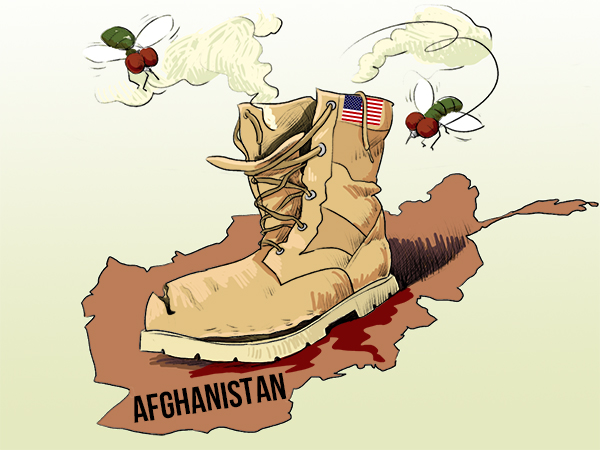A tale of two wars
- By Zhao Jinglun
 0 Comment(s)
0 Comment(s) Print
Print E-mail China.org.cn, October 31, 2014
E-mail China.org.cn, October 31, 2014
|
[By Yang Yongliang/China.org.cn] |
The Vietnam War
The United States recently marked the 50th anniversary of the Vietnam War. President Obama delivered the following words:
"We pay tribute to the more than 3 million servicemen and women who left their families to serve bravely a world away from everything they knew and everyone they loved. From Ia Drang to Khe Sanh, from Hue to Saigon and countless villages in between, they pushed through jungles and rice paddies, heat and monsoon, fighting heroically to protect the ideals we hold dear as Americans."
It is amazing that he should have embellished that ignominious war. He neglected to mention the fact that in Operation Ranch Hand, the U.S. military dumped 18 million gallons of herbicides, including Agent Orange, on the villages of Vietnam. He also failed to mention the My Lai massacre, the use of napalm and the carpet bombing of Cambodia.
In all, between 2 and 3 million Vietnamese, Laotians and Cambodians were killed in the Vietnam war, along with 58,000 U.S. soldiers (and many committed suicide afterward).
The Vietnam War was the first major war in which the United States suffered defeat. The image of the hasty evacuation of Saigon is still fresh in the people's memory.
The "Vietnam Syndrome" remained until the First Gulf War of 1991. Stanley Karnow, journalist and historian, told General Stanley MacCrystal, then commander of U.S. forces in Afghanistan, that the lesson of Vietnam is that "we should never have been there in the first place."
The Afghan War
U.S. and British soldiers have completed their combat duties in Afghanistan. On Oct.26, they lowered their flags for the last time and turned over their huge bases, Camp Leatherneck and Camp Bastion in southwestern Helmand Province to Afghan security forces.
Those bases served as the international coalition's regional headquarters. The coalition, led by NATO since 2003, also included forces from Germany, Italy, Jordan and Turkey.
George W. Bush launched Operation Enduring Freedom on Oct. 7, 2001 with the United Kingdom exactly 13 years ago. In December 2001, The United Nations Security Council established the International Security Assistance Force (ISAF) to oversee the military operations and train Afghan National Security Forces. In 2003, NATO assumed leadership of ISAF.
By November 2001, the Taliban lost its last stronghold in Kandahar. But then, Bush shifted his attention to the war in Iraq, which allowed the Taliban to stage a comeback.
In 13 years of war, tens of thousands of people were killed. Over 4,000 ISAF soldiers and civilian contractors lost their lives, including 2,210 Americans and 453 Britons. Many thousands more were severely injured. Over 10,000 Afghan National Security Forces were also killed.
At the cost of so much blood and more than US$1 trillion, what has the coalition gained? It has been claimed that more than 4 million more children, and 1.5 million more girls, are now in school than there were under the Taliban.
But according to a new book by Anand Gopal, "No Good Men Among the Living: America, the Taliban, and the War Through Afghan Eyes", of the 4,000 teachers currently on the payroll in Ghor, perhaps 3,200 have no qualifications – some cannot read and write....80 percent of the 740 schools in the province are not opening at all. and Ghor is one of the least "Taliban threatened" provinces of Afghanistan.
After the withdrawal of ISAF, the best prospect is political accommodation with the Taliban; the worst is civil war.
The new president Ashraf Ghani has a real tough job on his hands.
The writer is a columnist with China.org.cn. For more information please visit: http://www.china.org.cn/opinion/zhaojinglun.htm
Opinion articles reflect the views of their authors, not necessarily those of China.org.cn.







Go to Forum >>0 Comment(s)